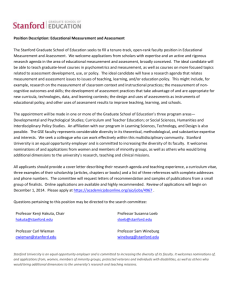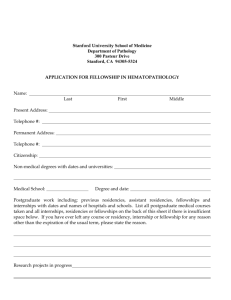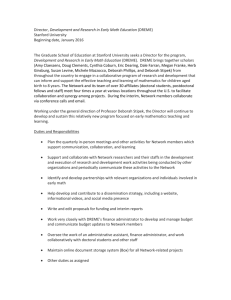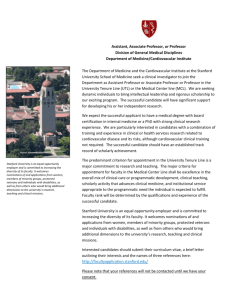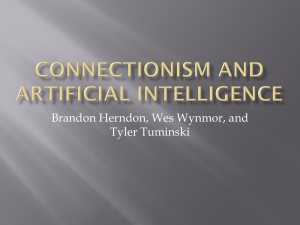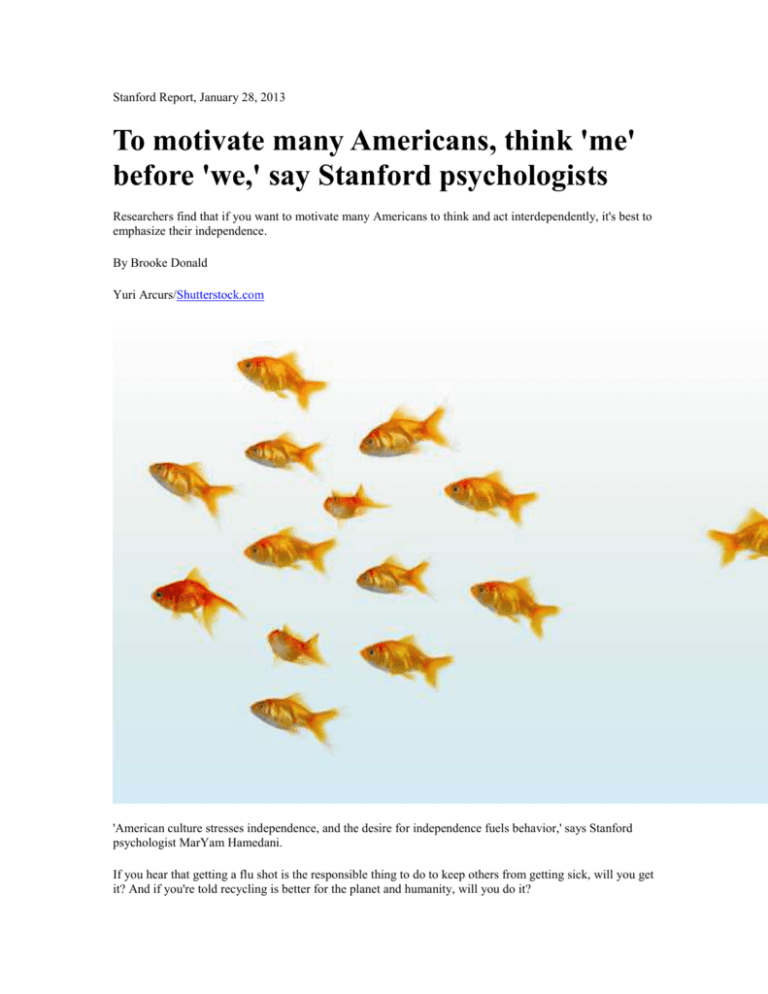
Stanford Report, January 28, 2013
To motivate many Americans, think 'me'
before 'we,' say Stanford psychologists
Researchers find that if you want to motivate many Americans to think and act interdependently, it's best to
emphasize their independence.
By Brooke Donald
Yuri Arcurs/Shutterstock.com
'American culture stresses independence, and the desire for independence fuels behavior,' says Stanford
psychologist MarYam Hamedani.
If you hear that getting a flu shot is the responsible thing to do to keep others from getting sick, will you get
it? And if you're told recycling is better for the planet and humanity, will you do it?
It turns out that for many Americans, the answer is no.
A new study by Stanford psychologists finds that Americans aren't driven by appeals to think and act
interdependently, and in fact, those messages may decrease motivation.
"American culture stresses independence, and the desire for independence fuels behavior," says MarYam
Hamedani, one of the study's authors. "People often like the idea of working together and certainly care
about social issues. But our findings show that thinking about and caring about others doesn't always
translate into effective action."
The study, "In the Land of the Free, Interdependent Action Undermines Motivation," was published this
month in the journal Psychological Science. Stanford psychology Professor Hazel Rose Markus and
graduate student Alyssa Fu are co-authors.
More and more, Americans are exposed to messages urging them to be interdependent, the researchers
noted. As recently as Monday, President Barack Obama noted in his second inaugural address, "The
American people can no more meet the demands of today's world by acting alone."
Interested in how independently minded Americans might respond to these types of messages, the
researchers conducted three experiments to test their motivation.
In the first experiment, participants – all Stanford students – were given difficult word puzzles to solve. In
the second, they were given a physical challenge to see how long they would persist at it. During both
tasks, participants were primed to think either about independence or about interdependence.
After the initial priming, the researchers found that white American participants were less motivated to
persist at these challenging tasks when ideas of interdependence were brought to mind.
Primed with the idea of working together, participants were less persistent in solving difficult puzzles and
applied less physical pressure in a test of their strength.
In the third experiment, designed to test these motivational effects in relation to a pressing social issue,
students were asked to give their opinions about a class on promoting environmental sustainability after
viewing a website about the course.
When the course description emphasized interdependent behavior – working together, being adaptive and
taking others' views into perspective – white American students predicted they would put less effort into
the course and were less likely to agree that taking the course should be a university requirement than when
the course description emphasized independent behavior – taking charge, being unique and knowing your
own perspective.
Students also said they would be less motivated in the class, which explained why they supported the
course less when their participation was framed in terms of interdependence rather than independence.
The researchers also found that, across the three studies, the motivation of Asian American students did not
vary when interdependence or independence were invoked.
The authors noted that bicultural Asian American students are exposed to both mainstream American
culture, which stresses independence, and East Asian culture, which stresses the value and importance of
interdependence. As a result, appeals to think and act interdependently or independently were equally
motivating.
The experiments show that motivation to act is deeply tied to cultural context, said Hamedani, who was a
graduate student when these studies were conducted.
The findings also suggest that people's psychologies could be changed with a cultural shift, she said. If the
American culture becomes more interdependent and begins to consistently promote the value and the
positive consequences of emphasizing the "we" and not just the "me," American psyches will follow.
Hamedani, now the associate director at Stanford's Center for Comparative Studies in Race and Ethnicity,
said the findings could also help policymakers, marketers and others interested in framing their messages
more effectively.
"Currently, if we want to inspire Americans to think and act interdependently, it may work best to actually
emphasize their independence to motivate them to do so," Hamedani said. "Tell them, 'Be the change you
want to see in the world' instead of 'We're all in this together.'"
Media Contact
MarYam Hamedani, Center for Comparative Studies in Race and Ethnicity: (650) 723-8449,
maryamh@stanford.edu
Brooke Donald, Stanford News Service: (650) 725-0224, brooke.donald@stanford.edu
© Stanford University. All Rights Reserved. Stanford, CA 94305. (650) 723-2300.


